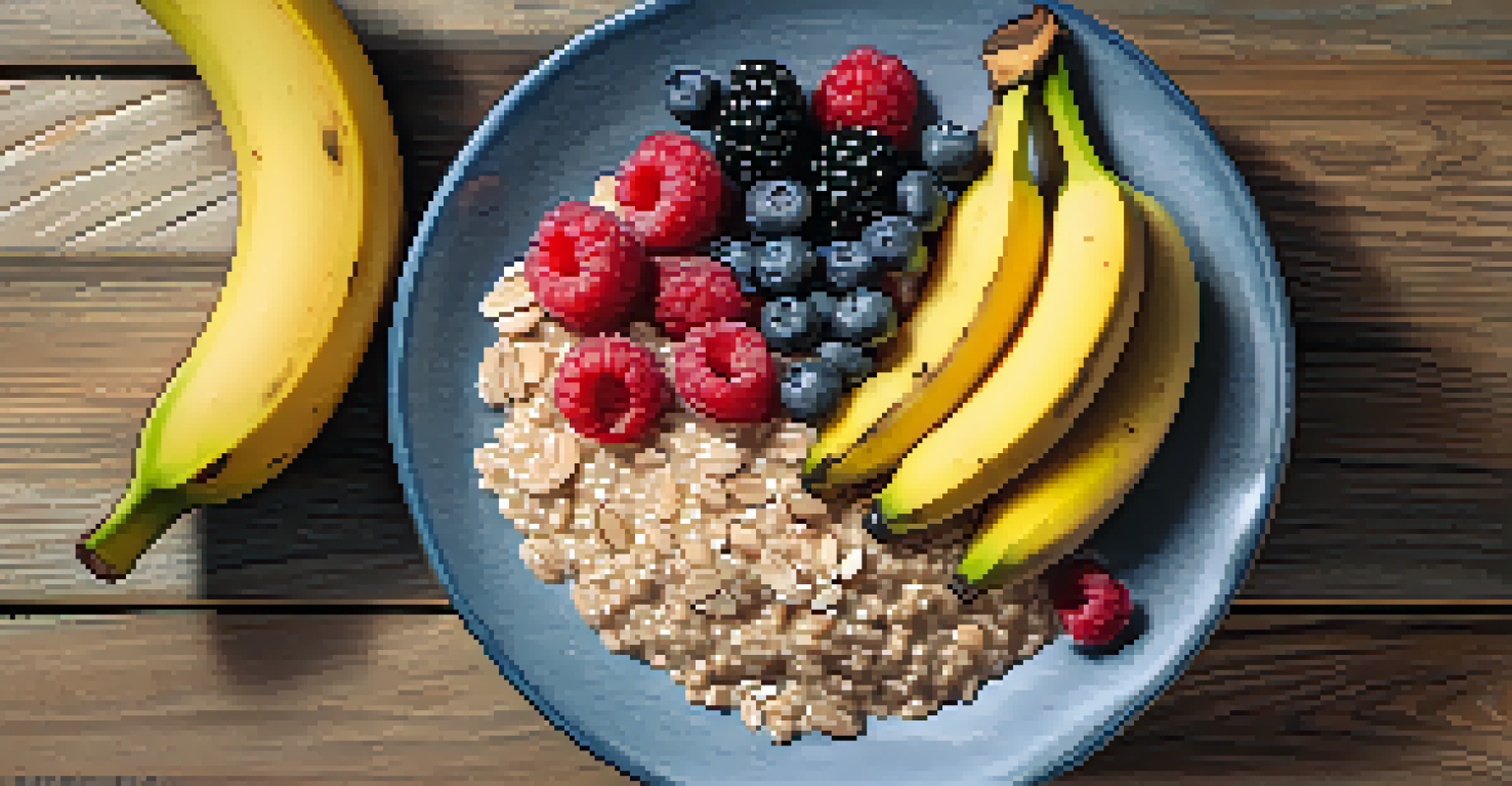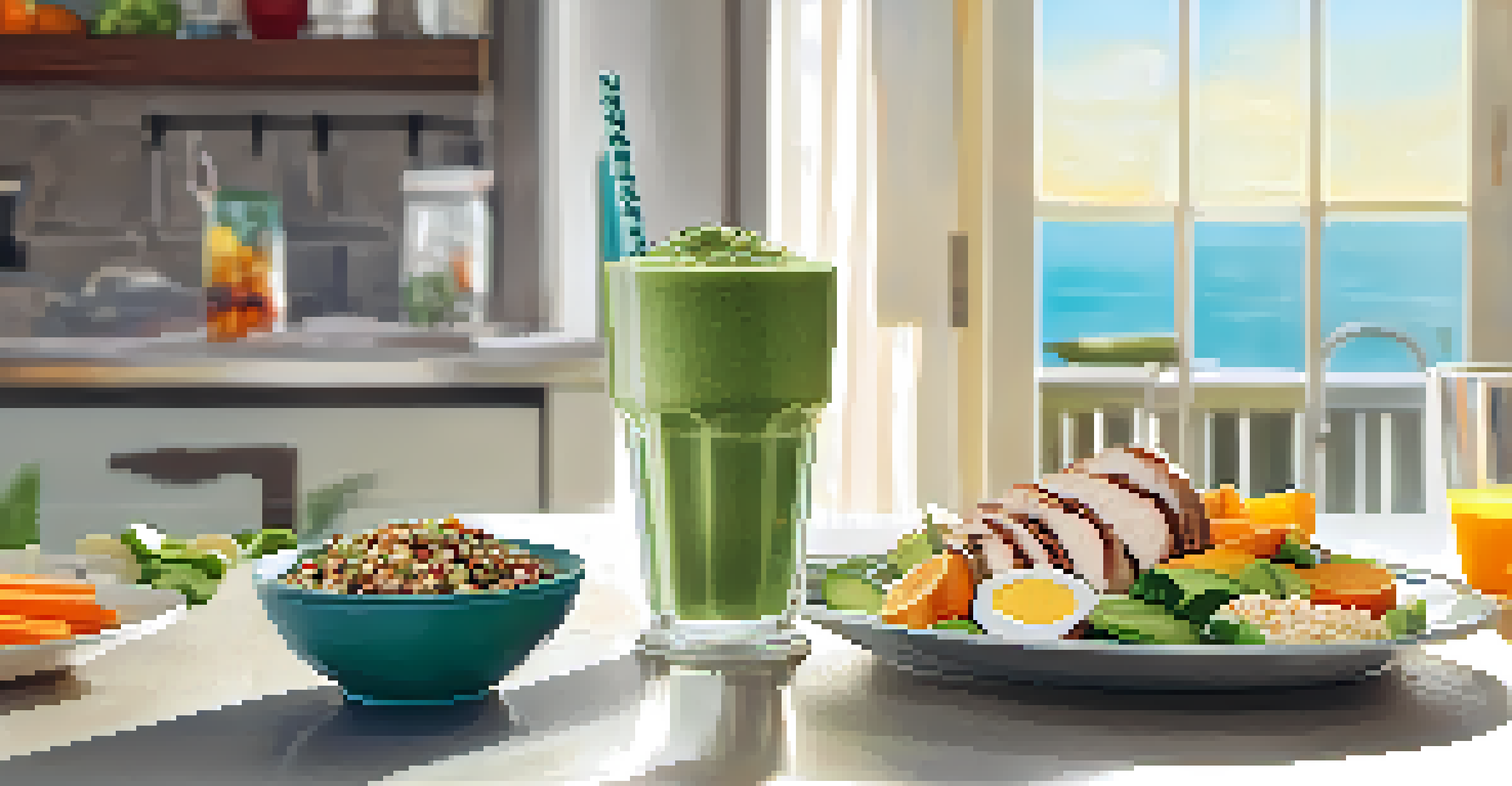Nutrition for CrossFit: Unique Dietary Needs

Understanding CrossFit's Physical Demands
CrossFit is not just a workout; it's a high-intensity fitness program that combines elements of weightlifting, gymnastics, and cardio. This diverse approach requires a body that can perform at its peak, meaning nutrition plays a crucial role in supporting these varying demands. It's essential for athletes to understand that their dietary choices can significantly impact their performance and recovery.
Take care of your body. It's the only place you have to live.
The intensity of CrossFit workouts can lead to a high caloric expenditure, which means athletes need to fuel their bodies adequately. Consuming the right balance of macronutrients—proteins, fats, and carbohydrates—becomes vital. Each nutrient serves a unique purpose, whether it's providing energy, aiding recovery, or building muscle.
Moreover, CrossFit often involves repeated bouts of intense exercise, which can lead to muscle fatigue and soreness. Therefore, a well-rounded diet not only supports performance during workouts but also enhances recovery time, allowing athletes to train consistently and effectively.
Key Macronutrients for CrossFit Athletes
Macronutrients are the building blocks of nutrition and play a significant role in any athlete's diet, especially for those engaged in CrossFit. Proteins are essential for muscle repair and growth, making them a staple for post-workout meals. Aim for high-quality sources like lean meats, fish, eggs, and plant-based options such as beans and lentils.

Carbohydrates are the primary energy source for high-intensity workouts like CrossFit. Incorporating complex carbohydrates, such as whole grains, fruits, and vegetables, helps maintain energy levels throughout training sessions. It's important to time carbohydrate intake to ensure you're fueled before workouts and replenished afterward.
Nutrition Fuels CrossFit Performance
A balanced diet rich in macronutrients is essential for optimizing performance and recovery in CrossFit athletes.
Fats should not be overlooked either; they provide a concentrated energy source and support hormone production. Healthy fats from sources like avocados, nuts, and olive oil can help sustain energy during longer workouts, ensuring that athletes have the endurance needed to power through.
Hydration: The Unsung Hero of Performance
When discussing nutrition, hydration often takes a backseat, but it's a vital component of any athlete's regimen. CrossFit workouts can lead to significant fluid loss through sweat, making it essential to stay hydrated. Dehydration can impair performance, leading to fatigue and reduced strength during workouts.
You are what you eat, so don't be fast, cheap, easy, or fake.
A good rule of thumb is to drink water before, during, and after workouts to maintain optimal hydration levels. Consider electrolyte-rich drinks if your workouts are particularly intense or lengthy, as they can help replenish lost minerals and keep your energy levels high. This is especially important in warmer climates or during summer months.
Incorporating hydrating foods like fruits and vegetables into your diet can also support overall hydration. Foods like watermelon, cucumbers, and oranges not only provide hydration but also essential vitamins and minerals that aid recovery and performance.
Pre-Workout Fuel: What to Eat and When
The right pre-workout nutrition can set the tone for your CrossFit session. Consuming a balanced meal or snack about 30 minutes to an hour before training can provide the necessary energy and help prevent fatigue. Focus on a combination of carbohydrates and protein to fuel your workout effectively.
For example, a banana with a scoop of nut butter or a small bowl of oatmeal with berries can provide the energy needed without weighing you down. It's crucial to experiment with different foods to find what sits well in your stomach and provides optimal energy levels.
Hydration is Key for Success
Staying hydrated before, during, and after workouts is crucial for maintaining energy levels and preventing fatigue.
Timing is also important; eating too close to a workout may lead to discomfort. On the flip side, not eating at all can leave you feeling sluggish and unprepared, so finding the right balance is key to maximizing your performance.
Post-Workout Nutrition: Recovery Essentials
Post-workout nutrition is equally important, as it helps replenish glycogen stores and supports muscle recovery. Consuming a meal or snack rich in protein and carbohydrates within 30 minutes after exercising can significantly boost recovery. This is when your muscles are most receptive to nutrients, making it a prime time to refuel.
A protein shake with a banana or a chicken wrap with quinoa can be great options for recovery meals. The protein aids in muscle repair, while the carbohydrates help restore energy levels. Don't forget to rehydrate, as fluids lost during workouts need to be replaced.
Additionally, incorporating some healthy fats can further enhance recovery by reducing inflammation and promoting overall health. Foods like nuts, seeds, or avocado can be a delicious addition to your post-workout meal, ensuring a well-rounded approach to recovery.
Micronutrients: Small but Mighty
While macronutrients often steal the spotlight, micronutrients—vitamins and minerals—are equally essential for CrossFit athletes. They support various bodily functions, from energy production to immune health. A well-rounded diet rich in fruits, vegetables, and whole grains can help ensure you're getting the necessary micronutrients.
Pay attention to key vitamins and minerals like calcium, magnesium, and vitamin D, which are crucial for bone health and muscle function. Foods like leafy greens, nuts, seeds, and dairy products are great sources that can easily be incorporated into meals and snacks.
Personalize Your Nutrition Plan
Listening to your body's signals and adjusting your diet accordingly can enhance your CrossFit experience and results.
Remember, deficiencies in micronutrients can lead to fatigue, decreased immunity, and slower recovery times, all of which can negatively impact your CrossFit performance. Keeping a colorful plate can be a good strategy to ensure you're getting a variety of nutrients.
Listening to Your Body's Signals
Ultimately, nutrition for CrossFit is not a one-size-fits-all approach. Every athlete's body is different, and what works for one person may not work for another. It's crucial to listen to your body's signals and adjust your nutrition based on how you feel during workouts and throughout the day.
Keeping a food diary can help track what you eat and how it affects your performance and recovery. This can provide insights into which foods energize you and which may leave you feeling sluggish. Don't hesitate to tweak your diet based on these observations.

Additionally, consulting with a nutritionist or dietitian can provide personalized guidance tailored to your unique needs and goals. They can help you navigate the complexities of nutrition and optimize your diet for CrossFit performance.